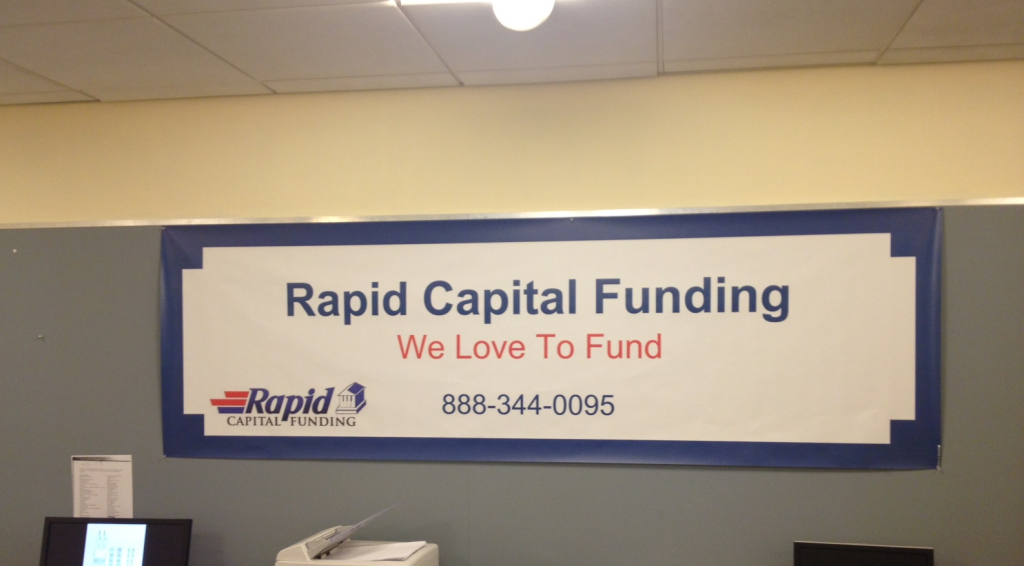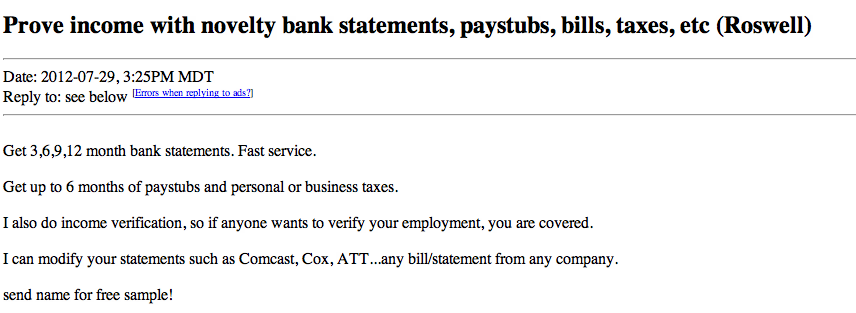merchant cash advance leads
The Funders of Summer
August 2, 2012What’s new? Who funded? What happened? Merchant Processing Resource will try to give you a glimpse into the Merchant Cash Advance (MCA) universe:
We all know salespeople love to fund, but underwriters?!! This banner hangs on the wall of the underwriting department at mid-sized MCA firm, Rapid Capital Funding:

Holy Moses Batman! $10 Million in a month?! Yellowstone Capital is reporting a new personal monthly funding record of $10,245,000.

There has been an influx of really creative instructional/promotional videos about MCA lately. Cartoons are really “in” right now:
PayPal white labeled a Merchant Cash Advance program in the U.K.
Will the mega banks be next?
It feels like 2006 all over again says First Annapolis Consulting in a recent article:
This seems to be the same bullish sentiment that surrounded the industry in 2006, when there was a constant influx of new MCA providers into the industry and what appeared to be unlimited financial sources. What might be different now is the experience accumulated in the industry during the recession. In the last few years, and as a result of the mounting losses that the industry suffered during the economic crisis, MCA players have implemented more conservative risk management practices and procedures.
Underwriters industrywide are also reporting that stacking, splitting, double funding, and fake statements are on the rise. It certainly brings back some nostalgia for veterans and not the good kind. A screenshot of a current ad on craigslist that is directed at bad apple merchants:

A new chapter opened for Merchant Cash Advance (This is soooo last month but a great read if you missed it).
http://greensheet.com/emagazine.php?issue_number=120602&story_id=3088
Is the loan shortage a banking problem or a merchant problem? Ami Kassar makes the case in his New York Times column.
“Where are the leads? I need the leads. Can you tell me where the leads are?” We literally get asked daily where to get leads from. We recommend:
http://SmallBusinessLoanRates.com
http://meridianleads.com
By the way… for every company that says cold calling doesn’t work, there’s a company getting rich doing just that. Same goes for SEO, mailers, e-mail blasts, PPC, and so. Marketing is an art form. Just because it doesn’t work for you, doesn’t mean it doesn’t work period. Keep doing what you’re doing. Too many ISOs/agents/marketing directors abandon campaigns after 30-60 days. Practice makes perfect!
Have you abandoned social media? We ask this question: What looks worse to a prospect?
Not having a business twitter account or having one but failing to tweet at all in the last 8 months?
Not having a business blog or having one but failing to add any new blog posts in over a year?
We didn’t spend much time researching hard data but we would surmise that freshness is a psychological component to a prospect’s shopping experience. If a business blogged regularly on their site up until May, 2011 and then stopped, might a merchant think the entire business itself is abandoned or gone? Is a facebook fan page with 1 post from 8 months ago a positive or negative selling point? WE SAY: If you build it, maintain it. Nothing brings down your presence on the Internet like abandonment. We understand that smaller companies might not have the manpower, time, or creative energy to write informative articles or engage people through social networking, especially when it’s hard to measure the results and value it creates. Consider the value you might actually be losing by projecting to the world that you have given up. It’s like operating a store with a sign out front that says “THIS BUILDING HAS BEEN CONDEMNED” even though you are actually open for business. If WE stopped posting articles for a year, would you still come back several times a month?

Here are two examples of MCA firms that keep it FRESH!:
http://unitedcapitalsource.com/blog/
http://takechargecapital.com/category/blog/
Don’t you just love MCA? We do! Visit our site again soon.
– Merchant Processing Resource
https://debanked.com
Why LinkedIn is King
June 9, 2012This may be risky…but we’re doubling down on LinkedIn. The Los Angeles Times will disagree with us, since they recently embraced the radical view that LinkedIn is a big joke. Sure, LinkedIn recently got hacked and that’s a major security issue they’ll need to deal with, but for the haters that brag they haven’t logged into their accounts in years, they probably missed the point of this social media site. LinkedIn isn’t Facebook. They aren’t even competitors. If you want to share your funny photos and write witty updates about how you hate work, please by all means spare the rest of the business world from it. We’ve got some tips for those haters:
- If you view your job as a 9-5 that’s a burden to living your life, LinkedIn is not for you.
- If you’re employed in an entry level position and don’t care about climbing the corporate ladder, LinkedIn is not for you.
- If your goal is to make sure that you never get any kind of individual recognition in your field, LinkedIn is not for you.
- If you want to avoid talking about your line of work with other like-minded people in a way that can help you grow, LinkedIn is not for you.
- If you’re a business owner that has no desire to speak to other business owners, LinkedIn is not for you.
- If you LOL at the thought of networking, in person or online, LinkedIn is not for you.
- If you want to spam the Internet and submit updates that no one will ever read, go sign up for Google Plus.
LinkedIn isn’t a resumé site or a social network. It’s a cooperative movement to make the private sector vastly more efficient. We’ve heard grumblings from Merchant Cash Advance industry insiders that some of the most popular vBulletin-style forums are pretty much losing their value. The discussion is sporadic, many people hide behind a screen name, and there isn’t any way to validate the information being shared. At best, it’s an anonymous way to spread propaganda. Traditional web forums rely on users to visit the site and once there, go on a scavenger hunt to find new posts and discussions. If there are no new posts, then the time spent going to the forum is nothing more than a waste.
LinkedIn has groups, which are monitored and policed by the group owner much like a forum would be. The stakes are upped because everyone participating can view each other’s business credentials through their profiles. In a traditional web forum, you get situations like this all the time:

The individual offering to sell leads looks highly suspect. If only there were a way to find out who they really were, where they were located, how long they’ve been in the lead business for, what company they work for, who else they know in the industry, who has publicly recommended them, etc. Even if they had included a real company e-mail address and website in their post, there would still be much more information left to be desired. We believe it’s a lot harder to accomplish anything with anyone you don’t know via the inherent anonymity of traditional web forums. Sure, anyone can fake their credentials on LinkedIn but if you see they’re connected with a former colleague of yours, you can call that old colleague right up and get the scoop. The transparency leads to transactions that get closed faster and both parties can feel more confident in their decisions to do business with a stranger.
Is LinkedIn perfect? No, it’s not. But the results are incredible if you know how to use the site correctly. We’ll put it this way, in the month of May, LinkedIn brought 21% more visitors to our site than what came organically from the Bing search engine. If you LOL at that because Bing is notoriously smaller than Google, just think about how much money you or other people you know are spending on SEO experts to get traffic from search engines. So LOL it up because LinkedIn is free.
Those statistics also don’t count the relationships we’ve built purely through the site itself. You see, it’s not always about making a sale and the numbers of connections you have isn’t what we mean by relationships. You’re a lot better off reading the updates of a C-level executive on the ins and outs of Crowd Funding in a LinkedIn group than you would be from reading a sensationalist, empty opinion about it by the LA Times. Comment intelligently to that exec’s posts and you could find them wanting to connect with you to discuss further and possibly do some kind of business together.
Here are some of the industry groups we recommend you check out:
We cordially invite the haters described in the bullet point list above NOT to join. Not that we should really worry they will. If you actually visit the twitter accounts that the LA Times cites as proof of LinkedIn’s unpopularity, you’ll find that these people spend their time online talking about Kim Kardashian, Lindsay Lohan, and other useless crap. They read like play-by-play diaries of a junior high school girl. Hate away losers, they made twitter just for people like you.
The SEO War Continues
April 4, 2012In the last few weeks, Google dropped a nuclear bomb on the SEO battlefield. Some of you may have noticed but no one really wants to talk about it. Who would want to publicize the fact that their website has plummeted from page 1 to page 25 after investing tens or hundreds of thousands of dollars a year to rank on page 1 for a hot keyword? To be the one holding the bag when the bubble bursts has obvious economical consequences but can also be emotionally damaging. So what happened?
In March, Google de-indexed and banned some of the major subscription-based blog networks and effectively wiped out thousands of backlinks for companies throughout the world. Many in the MCA space have secretly been using these networks to compliment their SEO strategy or worse, be the focal point of it. Blog networks such as BuildMyRank (which has been completely shut down) allowed their subscribers to submit up to ten articles per day. These articles are usually a minimum of 150 words and contain at least 1 link pointing to the subscriber’s website. At the rate of 10 articles per day, a company could build at least 300 highly contextual backlinks per month and easily jump in search results over the competition.
We could write 5 articles today with no problem but task us with 300 and we’ll run out of content after 20 and be mentally exhausted after 50. The quality of the content would likely suffer and there would eventually be a point where it was even too cumbersome to produce gibberish. Some of you may think the article you’re reading now is gibberish. 😉
And so the subscription fees were compounded by the cost of hiring writers internally or outsourcing the work. But when everyone in the industry was doing the same thing, the stakes were upped and MCA companies were forced to use new methods. One blog network subscription turned into four and paying for links and issuing PRWeb press releases became the cost of staying competitive, rather than being the recipe to rank the highest. The subscriptions, the labor, the link purchases, online releases, and other costs to stay visible on the Internet have become increasingly material line items on P&Ls in effort to get to Page 1.
But being listed on page 1 doesn’t guarantee clicks or conversions. In fact, if you’re not in the top 3 for a particular keyword there’s a good chance you won’t experience any clicks at all. According to a study performed by Slingshot SEO, humans just don’t like clicking anything but what’s on top.

While some of the MCA companies that relied heavily on the defunct blog networks have practically disappeared from the search results altogether, those that used them in moderation have fallen out of the top 3. Going from position 1 on page 1 to position 5 on page 1 can be practically the same as going out of business.
 Internet marketing became exponentially popular in the MCA space just in the last twelve months mainly due to the seemingly low cost and reported success by online lead generation companies. For small to mid-sized ISOs, spending $100 on a website with Godaddy and trying to get the site ranked organically just seems so much easier and cost effective than surrendering to the expenses of hiring telemarketers, renting office space, running mailer campaigns, billboards, radio/tv ads, hiring multiple salespeople, and buying leads.
Internet marketing became exponentially popular in the MCA space just in the last twelve months mainly due to the seemingly low cost and reported success by online lead generation companies. For small to mid-sized ISOs, spending $100 on a website with Godaddy and trying to get the site ranked organically just seems so much easier and cost effective than surrendering to the expenses of hiring telemarketers, renting office space, running mailer campaigns, billboards, radio/tv ads, hiring multiple salespeople, and buying leads.
But diversifying your marketing strategy is key. Buy quality leads, mix it up with mailers or calls, or go door to door. Just don’t put all your eggs in one basket. As many companies learned in the last few weeks and more will learn in the ones upcoming as all the SEO penalties finally set in, Google runs the show. They can change their algorithm at any time and there’s nothing anyone can do about it. If you’re going to spend a million dollars for a Times Square billboard, make sure there’s no clause that allows them to move it to the middle of the Pacific Ocean. If you hadn’t figured out why your website is generating less leads lately, we’re sorry to be the bearer of bad news. Your billboard was lost at sea.
Read related article: The SEO War for Merchant Cash Advance
– deBanked
https://debanked.com
Merchant Cash Advance Leads Page Updated
March 8, 2012We have finally cleaned up the HTML of the Merchant Cash Advance leads page. When we transferred servers in August 2011, a lot of the CSS styling and html for certain pages were no longer supported. If you are looking for Merchant Cash Advance leads or interesting in having your company listed, the interface is now more aesthetically pleasing.
How Did Merchant Cash Advance Companies Get My Information?
August 4, 2010I used a Merchant Cash Advance program and now I am being solicited because of it. How did these companies get my information?
The Merchant Cash Advance industry is a competitive business. Most firms file a UCC-1 (public notice with your secretary of state) on your business to let potential creditors, lawyers, and other Merchant Cash Advance firms know your future credit card receivables have been purchased. This is customary for a loan as well, although the language in the filing is different.
Since this information is public, it is possible to request a list of all UCC-1’s filed by a particular funding company from the states. Each UCC-1 includes the DBA, Business Address, and Date it was filed. Computer programs or manual google searches can fill in the blanks and obtain the owner’s name and business phone number.
In just a few minutes, a competing Merchant Cash Advance firm or reseller can determine when you received funding and where you got it from. For the competition, It’s a free, easy way to create a marketing list.
The same can be done for traditional loans and equipment leases.





























